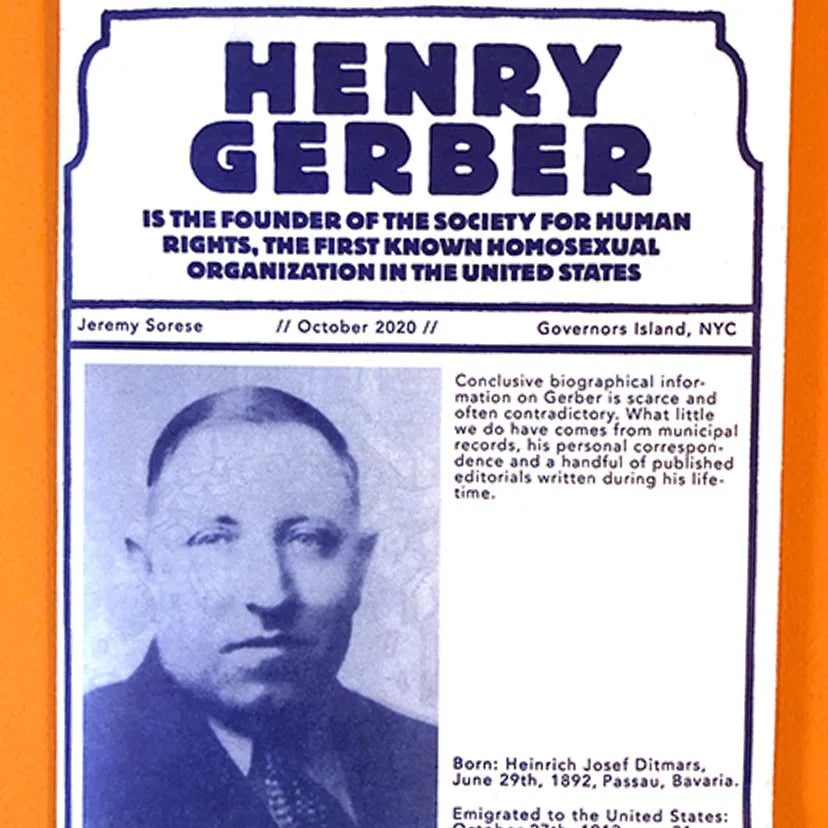
HUMAN RIGHTS DAY: A SPOTLIGHT ON A FOREFATHER OF GAY RIGHTS
On the 10th of December 1948, the United Nations General Assembly adopted and proclaimed the Universal Declaration of Human Rights (UDHR) resulting in the international celebration of the Human Rights Day. The pledge was and is still one of the world's most groundbreaking global pledges, protecting and championing rights that every individual is entitled to regardless of race, colour, culture, faith, gender and more, with this year's theme being "Freedom, Equality and Justice for All".

However, nearly three decades prior to the proclamation of the UDHR, a lone outburst of activism would lead to society's first gay rights organization that was spearheaded by a man named Henry Gerber. Henry Gerber, inspired by the efforts to reform the anti-homosexual law in Germany and experiencing one of the world's most open and progressive gay scenes of its time when he was stationed there, returned to the United States with a newfound understanding of what gay activism could look like.
The scene in the United States at the time was vastly different from what it is now, it was a time where people were arrested for engaging in gay sex, men and women were committed to insane asylums for their homosexuality. The community was largely relegated to saloons, speakeasies, and the realm of prostitution, often seen as lascivious and criminal with fear of official repression raining down at any given moment if the authorities choose to act on it. Gerber took a year to band together six men to join him on his venture, a non-profit called the Society of Human Rights (SHR) that was successfully granted the charter by the state of Illinois on the 10th of December 1924, making it the first and the oldest documented gay-rights organisation in the United States. He wanted to push for an end to sodomy laws and other forms of legal discrimination in order to free or save others like them from the futility and folly of prison sentences that many of them were victims of.

Following its establishment, the organisation soon started producing its own newsletter and the earliest-documented homosexual publication titled ‘Friendship and Freedom’. Despite the growing population of the gay community in Chicago and other large cities during the 1910s and ‘20s, the SHR had difficulty expanding with mainly impoverished gays joining in. The organisation was also unable to gain any financial support from the more affluent members of Chicago’s gay community, struggling to even gain the support of people in the medical industry or sexology advocates due to fears of ruining their reputations through the association with homosexuality. Gerber, through his determination and beliefs, shouldered all of the labour and financial obligations of the organisation, including the production of the newsletter.
In 1925 however, the organisation met an abrupt end when the wife of one of their bisexual co-founders reported her husband and the organisation to the authorities. Gerber and several others were arrested and prosecuted for their deviancy, with Gerber losing all his belongings, his entire life savings defending himself and losing his job due to the extensive, negative media coverage. Despite the warrantless arrests and social ostracism from both the general public and the gay community, Gerber’s vigour for activism and his vision would steam on through more covert means.
Through the 1930s, Henry Gerber would go on to write about the plights of homosexuals and their position in society for a variety of magazines under a pseudonym, even managing a personal correspondence club that became a national communications network for gay men. He would later direct his focus on building ways for gay people to get connected with one another through coded clubs and magazines in efforts of creating a healthier, safer community. Building the sense of collective identity for the community and laying the foundations for a later generations of activists.

Even though we’ve seen much progress throughout the 21st century, we still have a long way to go for many parts of the world. This year alone, many queer protective laws have been overturned, increasing violence towards the queer community, and a recent wave of conservatism is sweeping the United States. The need to fight for queer rights and spaces are as important as ever there, prodding the need for us to band together as a community in the face of rising conservatism and homophobia. Even in light of recent Israelian pinkwashing efforts, LGBTQ-led organisations have been playing a huge role in Palestinian solidarity efforts where queerness is being weaponised and put into a position of opposition against Palestinian people by the Israeli pinkwashing propaganda.

Looking at Gerber’s efforts alone and its influence in current-day activism, Queering the Map could be seen as a modern take on Gerber's correspondence club. It's modern take shifting its focus from connecting queer voices together to instead, archiving global queer experiences and giving power to queer voices while protecting their identities. Queering the Map has given a platform for people in less LGBTQ+ friendly countries a way to get their messages out and share their experiences on a global scale, especially shedding light on the voices of queer Palestinians caught in the midst of a genocide. Henry Gerber’s undying spirit and passion for the cause inspires us to strive for the freedom, equality, and justice of not just the global queer community, but for all. Human rights are non-transactional for what are we if without our humanity after all?
---
blog by Bernard Yap










